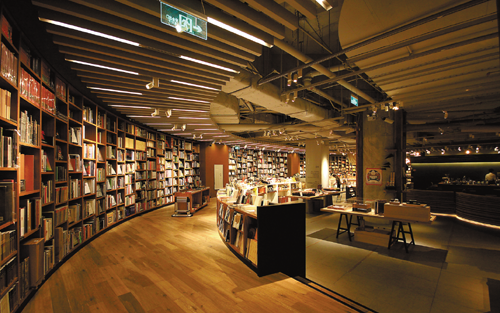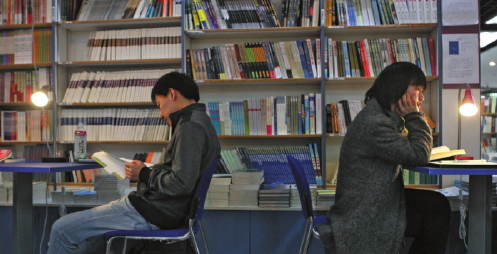
The Guangzhou-based bookstore Fang Suo Commune attracts people with not only its 130,000 books but also its unique shopping experience and various regular activities. [CHINA DAILY]

Readers burn midnight oil in Beijing's first 24-hour bookstore, the Sanlian Taofen Bookstore. [ZOU HONG/CHINA DAILY]
With the rise of e-books and online retailers, many booksellers are struggling to stay afloat. But as Xu Jingxi reports in Guangzhou, many brick-and-mortar stores are fighting back, providing customers with added extras.
Reading in the cafe at Fang Suo Commune is the best antidote to the stress and fatigue of a long day at work for Lu Xiaofei.
The PR specialist at a foreign consulate in Guangzhou enjoys her one-hour "mental spa" at the city's new hot spot for bookworms. She orders a cup of her favorite herbal tea and loses herself in Notes from a Small Island, a humorous book by US travel writer Bill Bryson. Wi-Fi is unavailable in the bookstore, allowing her to switch off from the outside world.
"For me, a bookstore is not only for learning and education. It is also a leisure place, like a restaurant, gym or fun fair," says the 31-year-old.
"I don't think physical bookstores will die out. The reading and shopping experience in an actual bookshop still matters."
Fang Suo boasts 130,000 books, but it also has many other attractions that keep Lu coming back. She can buy potted plants, imported handicrafts and even shop for clothes.
The bookstore also invites writers, musicians, artists and scholars from around the globe to give lectures at least once a week.
Fang Suo Commune opened in November 2011, right after one of the country's biggest private bookstore chains, O2SUN Bookstores, collapsed. But its business model has proved a success, and it attracts 2 million visits and sells about 400,000 books a year.
Bookstores are increasingly combining various businesses—whether it is a large store like Fang Suo, which has a 2,000-square-meter space in Guangzhou and plans to open branches in Chongqing and Chengdu this year, or a small mom-and-pop store like the Jaffe and Neale Bookshop & Cafe in the market town Chipping Norton in the United Kingdom.
"A bookshop is not old-fashioned. This is an important campaign we need to do," says Patrick Neale, co-owner of Jaffe and Neale Bookshop & Cafe and president of the Booksellers Association in the UK.
"Amazon likes to tell people that bookshops are old-fashioned and are for old people, but it's not true. You can get a modern shopping experience."
Among the "cool" services and events that Jaffe and Neale provides are regular creative writing courses, wine tastings and book recommendation parties.
"We booksellers need to take our books and services to customers rather than waiting for them to visit our shops," Neale says. He cites his bookstore's tent at local music festival as an example.
"The Chipping Norton Music Festival attracts 20,000 people annually. We pack the books and cafeteria stuff and 'reproduce' our bookstore in a tent at the festival. The sales during the three days can be as big as that of three weeks in the store."
Founded in 2000, Jaffe and Neale survived the downturn of brick-and-mortar bookstores in the UK from 2008 to 2013. Due to the economic downturn and the effect of e-books and online booksellers, the number of stores decreased from 1,350 stores to fewer than 1,000.
It was a tough period for physical bookstores all over the world. Even a giant like Borders, the second largest bookstore chain in the United States, was affected. It went bankrupt and closed its last 399 stores in 2011.
At a forum about the future development of independent bookstores hosted by Fang Suo in Guangzhou in February, speakers said the hardest period for brick-and-mortar stores has passed.
The speakers at the forum were founders and managers of bookstores that have stood the test of time, including Fang Suo, Jaffe and Neale, All Sages Books in Beijing, Eslite in Taiwan and Tsutaya in Japan, and observers of the publishing industry and bookstores.
"The prospect for bookstores depends on how different the shopping experiences they offer are from e-reading and online booksellers and on how good the experiences are to keep customers staying in the spaces," says Liu Suli, founder of All Sages Books.
Founded in 1993, the bookstore is regarded as a mecca for social sciences lovers in China as it has an extensive selection of academic books. Its Thinker's Cafe Bar attracts scholars and top businesspeople from home and abroad.
"A store only selling books won't survive in the market. Bookstores will target a smaller and smaller group of people in the future and dig out every possible interest of theirs to develop closely related commodities and events."
In Liu's vision, small independent bookstores, which were eliminated by super chains at the beginning of the 21st century before the rise of e-books and Amazon, will make a comeback.
And these bookstores will differentiate themselves from others by specializing in one particular area. There will be more unique bookstores like the Books for Cooks in London's Notting Hill area. The cookbook shop has a test kitchen where customers really "cook the books" by testing the recipes.
Neale says small independent bookstores can better address the challenges from the Internet than super chains, pitching it as a David and Goliath battle.
"David is a tiny shepherd while Goliath is a mighty warrior, but David wins because he is agile, runs around the giant and beats him with stones," Neale says.
"Similarly, independent bookstores can target a small group of people and offer detailed, accurate services, while it's difficult for big chains to develop in-depth knowledge about their customers and to tailor-make services for the general public."
Signs of independent bookstores' rejuvenation are evident in the UK market. Although the whole market's annual sales saw a drop of 16 percent in 2013 year-on-year, the sales of independent bookstores climbed from 120 million pounds ($201.5 million) in 2012 to 130 million pounds in 2013, according to Neale.
For bookstore chains to survive, they need to be bold enough to remove best-sellers from the shelves and replace them with selective books which are difficult to find online, says Seiichi Mizuno, former president of the Seibu Department Stores in Tokyo, who initiated the idea of opening a bookshop in the department store in the 1990s.
Neale suggests that the branches each focus on one area, so that they can distinguish themselves from one another.
Tsutaya, a chain of video rental shops and bookstores in Japan with 1,470 branches nationwide, has experimented with a new way of buying books in its branch Daikanyama T-Site that opened in 2011.
Most bookshops in Japan rely on recommendations from publishers because they can return the dead stock and don't need to worry about losing money.
"That's why customers are bored. They see the same books on shelves in most bookstores across the country," says Takahiro Kamata, executive officer of Culture Convenience Club, a Japanese company that operates Tsutaya.
"Only 12 percent of the books for sale in Daikanyama T-Site are the same as those in other Japanese bookstores," Kamata says. "To make reading a part of people's real life, we develop a lot of events, which customers can participate in."
For example, the bookstore has hosted morning markets, cooking workshops, traditional tea ceremonies and a vintage car parade.
Mao Jihong, president of Exception de Mixmind and a co-founder of Fang Suo Commune, says it's a big thrill for him to see customers like Lu, embracing the lifestyle that he advocates in the bookstore.
"Traditional Chinese culture values reading books, but this seems to have been forgotten by many people as they have been chasing wealth during the reform and opening up in the past three decades," Mao says.
"However, I still have a dream of opening a bookstore which is a public commune like the Ancient Agora of Athens, where knowledge, science, wisdom and lifestyle are spread to the public.
"It's the Utopia for many book lovers."
AT A GLANCE
The central government gave 90 million yuan ($14.4 million) in total to 56 physical bookstores in 12 cities last year and issued a policy that exempts the added-value tax for book wholesales and retailers from 2013-17.
Governments of Shanghai, Zhejiang, Tianjin, Jiangsu and Guangdong have also subsidized local bookstores with 56.4 million yuan combined by April 15.
The financial support and preferential policy were a shot in the arm. The number of the country's publication distribution sites was 173,900 in 2013, with a year-on-year growth of 2.1 percent, according to Ministry of Commerce. Data also shows that brick-and-mortar bookstores still take the leading role in the bookselling retail market, occupying about 85.5 percent of the market share.
We recommend:
